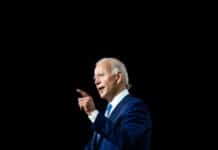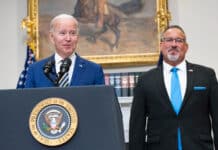
The Minnesota Supreme Court heard oral arguments last week in a lawsuit seeking to force the hand of Attorney General Keith Ellison on a controversy he may be covering up.
Energy Policy Advocates, the plaintiff, is arguing that documents pertaining to the AG office’s hiring of two attorneys from a Bloomberg-funded “climate law group” constitute public data and should be released. Ellison’s office, however, has concealed the documents thus far.
According to Legal Newsline, the case will hinge on the Minnesota justices’ interpretation of the Minnesota Government Data Practices Act, statute 13.65, which “presume[s] that government data is public unless a state or federal law provided that certain data is not public.”
During Wednesday’s arguments, Justice Ann McKeig pointed out an apparent contradiction in how Assistant Attorney General Oliver Larson interpreted the statute.
“[Your interpretation of 13.65] makes no sense to me, zero,” she said. “You define data on individuals as data not about individuals. [13.65] uses the term private data on individuals (confidential). For the AG to come here and say something different is really surprising to me.”
The two attorneys hired by Ellison’s office, affiliated with the New York University School of Law’s State Energy and Environmental Impact Center (SEEIC), are dedicated to “advancing progressive clean energy, climate change, and environmental legal positions.” Their names are Pete Surdo and Leigh Currie, and they were given the titles of “Special Assistant Attorneys General” in 2019.
The SEEIC is funded by Bloomberg Philanthropies and targets fossil fuel industries in various lawsuits. According to David Hayes, director of SEEIC, state attorneys general play a “unique role” for the group inasmuch as they “address complex energy and environmental matters.”
Representing Energy Policy Advocates in court is the Upper Midwest Law Center (UMLC), whose president and founder, Doug Seaton, believes Ellison acted illegally when he appointed Surdo and Currie to their posts.
“Ellison has exceeded his authority and violated the law and the attorneys’ code of ethics by allowing attorneys with a third party determined agenda, paid by that third party, a political donor, to operate as ‘Special Assistant Attorneys General,'” he told Legal Newsline last April.
The Minnesota Supreme Court has yet to make a decision in the case. Check back with Alpha News for further updates.

















